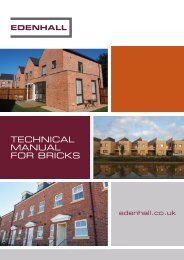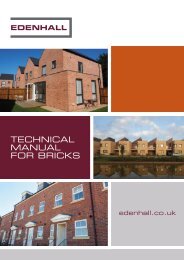Create successful ePaper yourself
Turn your PDF publications into a flip-book with our unique Google optimized e-Paper software.
BTB 2<br />
COMPARISON TABLE<br />
Concrete Bricks<br />
Clay Bricks<br />
British Standards<br />
BS EN 771-3: Aggregate Concrete Masonry Units<br />
BS EN 771-1: Clay Masonry Units<br />
Note: Both of the above Standards are manufacturing Standards only and as such make no reference to use or application.<br />
Compressive Strength<br />
>22.5N/mm 2 available up to 50N/mm 2 to special order<br />
Depends on brick type and manufacturer<br />
Note: Both BS 5628: Part 3 and the new PD 6697 give recommendations for which brick properties are required in various locations.<br />
For example, a minimum strength of 22.5N/mm 2 is recommended for a concrete brick used above and below dpc.<br />
Dimensions<br />
D1: +3-5mm in all dimensions<br />
D2: +1-3mm in all dimensions; ±2mm in height<br />
D3: +1-3mm in all dimensions; ±1.5mm in height<br />
T1: +1-6mm if the bricks are between 209-221 mm in length<br />
T2: +1-4 mm if the bricks are between 211-219mm in length<br />
T1: +1-6mm if the bricks are between 59-71mm in height<br />
T2: +1-4mm if the bricks are between 61-69 mm in height<br />
Water Absorption<br />
Generally 5-9% by weight<br />
Depends on brick type and manufacturer<br />
Composition<br />
Produced from naturally occurring aggregates, Portland cement, various<br />
admixtures and synthetic iron oxide pigments. Bricks are through<br />
coloured.<br />
Produced from naturally dug materials, frequently blended with other<br />
materials. Certain bricks may only have applied faces.<br />
Durability<br />
Fully frost resistant and with minimal soluble salts<br />
May contain metallic salts such as sodium, potassium and magnesium, and<br />
consequently are categorised as either SO (no requirement), S1 or S2.<br />
Under BS EN 771-1 the original FL grade is categorised as F2/S2.<br />
Although produced to a different standard, <strong>Edenhall</strong> bricks are equivalent to the old clay FL Grade<br />
Acoustic & Thermal Performance<br />
Highly resistant to sound transmission<br />
Moderate rate of thermal conductivity<br />
Depends on brick density and mass<br />
Green Credentials<br />
Produced using low cement content<br />
No additional heat required during curing<br />
Minimal water content used in manufacture<br />
CO 2<br />
emissions are minimal<br />
Bricks are recyclable<br />
No imports<br />
Flexibility in production factories<br />
Embodied CO 2<br />
is low @ 84kg/CO 2<br />
/Tonne<br />
Bricks are dried out prior to firing<br />
Kiln temperatures between 700-1100˚C and very energy intensive<br />
Large amounts of CO 2<br />
are emitted during firing process<br />
Frequent imports to subsidise stocks<br />
Bricks types tend to be unique to specific factories<br />
Embodied CO 2<br />
is high at 220kg/CO 2<br />
/Tonne<br />
Head Office: PD <strong>Edenhall</strong> Ltd, Danygraig Road, Risca, Newport, NP11 6DP Tel: 01633 612671 Fax: 01633 601280 edenhall.co.uk<br />
The information and guidance contained in our <strong>Technical</strong> Bulletins, <strong>Technical</strong> Data Sheets and <strong>Technical</strong> Manual are regularly reviewed as part of <strong>Edenhall</strong>’s continuous development and<br />
improvement programme. Updates and amendments can be made without notice and the Company cannot accept liability for any errors or omissions. The content of this document<br />
and the referenced data sheets and bulletins, including tables, diagrams and images, are subject to copyright.







